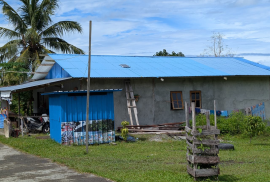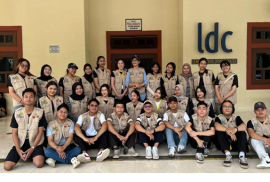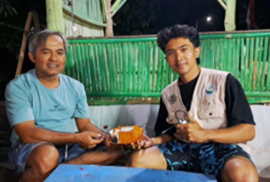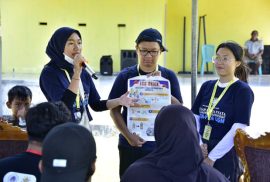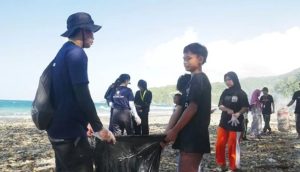Solar panels are installed on the roof of the house belonging to Otniel Kaway, the manager of Kolam Bambar, with a control box on the side of the house that leads directly to the parking lot.
Students of Universitas Gadjah Mada (UGM) participating in the Community Service–Community Empowerment Learning Program (KKN-PPM) have implemented an innovative project utilizing solar energy as an eco-friendly lighting source at the parking area of Kolam Bambar, Waibu District, Jayapura Regency. The program is part of the flagship initiatives under the main theme “Realizing Sustainable Development through the Development of Infrastructure and Contextual Education in the Sectors of Tourism, Agriculture, and MSMEs in Bambar and Doyo Lama Villages, Waibu District, Jayapura Regency, Papua Province,” carried out by 25 interdisciplinary students from Unit PA001.
The initiative stemmed from local residents’ concerns regarding the lack of lighting in the Kolam Bambar parking area. As a popular natural tourist attraction in Bambar Village, the site frequently welcomes both local and regional visitors for swimming, camping, and enjoying the surrounding scenery. However, darkness at night created discomfort and even led to cases of vehicle theft. “We wanted to provide a tangible solution by harnessing solar energy so that both community members and visitors can feel safer and more comfortable,” explained Frank Richard Yambe Yabdi, a student from the Faculty of Economics and Business and Coordinator of Unit PA001.
The solar power system developed is an off-grid Solar Power Plant (PLTS), consisting of a 50 Wp solar panel, a solar charge controller, a 12 V 35 Ah battery, and a 30 W spotlight. The solar panel was installed on the roof of the home of Otniel Kaway, manager of Kolam Bambar, with the control box mounted on the house wall facing the parking lot. The spotlight was placed at a low height to optimize its coverage.
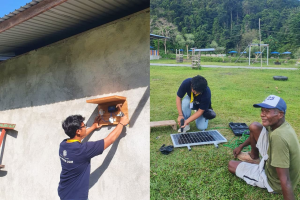 |
UGM KKN-PPM students from Unit PA001 when building a PLTS in Kolam Bambar with the community.
The program received strong support from local residents. John, one of the villagers actively assisting the installation process, expressed his gratitude. “I am very pleased with this program because it not only helps provide lighting but also demonstrates the importance of transitioning to renewable energy. I hope in the future it can be further expanded for greater impact,” he said.
The initiative also gained recognition from UGM Rector, Prof. Ova Emilia, M.Med.Ed., Sp.OG(K)., Ph.D., who conducted a monitoring and evaluation visit to Waibu District on July 23. She commended the students’ dedication in exploring local natural and human resources to enhance the community’s economy and well-being. “Many of the students’ programs have made significant contributions. Local leaders have even requested that UGM continue sending KKN students in future periods to ensure sustainability,” she noted.
Although the PLTS system is still small in scale, the benefits are already visible. Residents have begun reducing reliance on PLN electricity for parking area lighting, thus lowering monthly costs. More importantly, the initiative aligns with the Sustainable Development Goals (SDGs), particularly Goal 7 (Affordable and Clean Energy) and Goal 13 (Climate Action).
Muhammad Landie Gayuh Kirono, a student of the Faculty of Mathematics and Natural Sciences who participated in the project, reflected on his personal learning experience: “I realized that the knowledge I’ve gained can truly be useful. With this small program, we were able to provide a concrete solution for the community while also reminding ourselves to be more grateful for what we already have.”
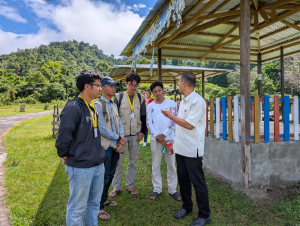 |
Director of Community Service at UGM during a discussion with UGM KKN-PPM students who built a PLTS in Kolam Bambar
Dr. dr. Rustamaji, M.Kes., Director of Community Service at UGM, also visited the site and praised the students’ efforts. “This student initiative may be simple, but its impact is real. Through the eco-friendly lighting system at Kolam Bambar, we see how knowledge can be translated into action that directly benefits the community. Such initiatives deserve to be continued and further strengthened,” he emphasized.
This program marks an important first step in promoting renewable energy at the local level, while reinforcing UGM’s commitment to energy independence and community empowerment through KKN-PPM activities. Moving forward, UGM hopes that this small but meaningful step will inspire students, local governments, and communities alike to collaborate in delivering innovative solutions with broad benefits for society.
Tags: #SDGs #SDG7 #SDG13 #PLTS #RenewableEnergy #KKNPPMUGM #communityservice
Contributor: Muhammad Landie Gayuh Kirono
Author: Bil

